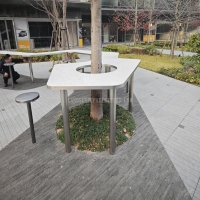Welcome to the website for landscape facilities products and knowledge.
How do landscape tables perform in terms of resistance to chemical corrosion from pollutants or de-icing agents?
Landscape tables, commonly used in outdoor settings, are often exposed to harsh environmental conditions, including chemical pollutants and de-icing agents. Their performance in resisting chemical corrosion depends on the materials used in their construction.
1. Material Composition: High-quality landscape tables are typically made from corrosion-resistant materials such as powder-coated steel, aluminum, or treated wood. These materials are designed to withstand exposure to industrial pollutants, road salts, and other corrosive substances.
2. Protective Coatings: Many manufacturers apply specialized coatings, such as epoxy or polyurethane, to enhance resistance. These coatings create a barrier that prevents chemicals from penetrating the surface, reducing the risk of rust or degradation.
3. Long-Term Durability: Tables made from stainless steel or marine-grade aluminum excel in harsh environments, as they naturally resist oxidation and chemical damage. Regular maintenance, like cleaning and reapplying protective sealants, can further extend their lifespan.
4. Environmental Factors: Tables in urban or coastal areas face higher exposure to pollutants and salt. Choosing materials with high corrosion resistance is critical for longevity in such conditions.
By selecting the right materials and maintaining them properly, landscape tables can remain durable and visually appealing despite exposure to corrosive agents.
Related search:

Recommendation
An outdoor bar counter with stainless steel and terrazzo materials in an irregular shape